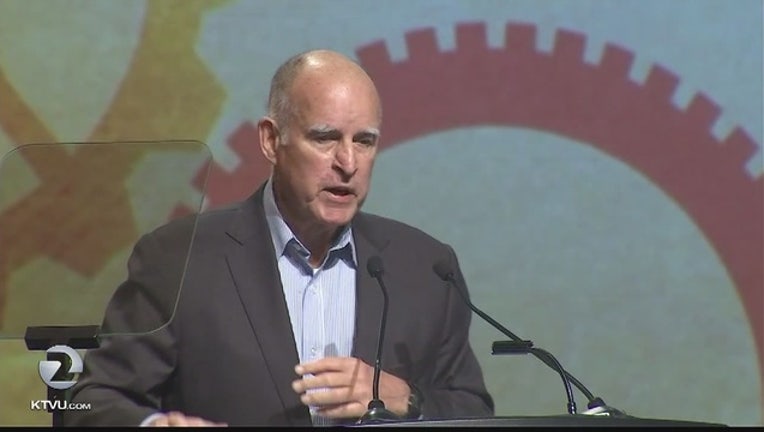Gov. Brown signs plan that raises gas tax to fix California roads

SACRAMENTO, Calif. (AP) -- California drivers will see gas prices jump in November and will pay more to register their vehicles come January after Gov. Jerry Brown signed into law Friday a tax hike of $5 billion per year to fix the state's crumbling highways.
Brown and his legislative allies said the money is badly needed to fill potholes and repair rutted roads that lengthen commutes and damage vehicles.
"Safe and smooth roads make California a better place to live and strengthen our economy," Brown said in a statement. "This legislation will put thousands of people to work."
In the bill, SB1, the money is split roughly evenly between state highways and local roads.
The California Transportation Commission, appointed mostly by Brown, will approve projects for the funding and the first new construction work on state highways will likely begin in the summer of 2018, said Mark Dinger, a spokesman for Caltrans. Dinger said some existing projects may be sped up.
Local projects could get off the ground sooner, said Randy Breault, a public works director in Brisbane who serves on the board of directors for the California League of Cities. Once cities know when they will receive the money, he said some may be able to begin work on projects within weeks.
The plan aims to address a $59 billion backlog in deferred maintenance on state highways and $78 billion on local streets and roads. It raises gas taxes by 12 cents per gallon in November, and to 19.5 cents increase by 2020. Diesel taxes will rise by 20 cents per gallon and diesel sales taxes by 4 percent.
Drivers will pay a new vehicle registration fee ranging from $25 to $175 depending on value of their vehicles.
Senate Minority Leader Patricia Bates said Brown and Democratic lawmakers should have embraced a plan to fund road repairs that did not increase taxes.
"Californians got a lemon of a gas and car tax hike today," the Laguna Niguel Republican said in a statement. "This tax hike particularly hurts Californians struggling to make ends meet."
A few of the state projects that will get money are known, including an extension of a commuter rail line between the Central Valley and Silicon Valley, a parkway linking the University of California, Merced to a major state highway and highway expansion in Riverside County. Those projects were promised to undecided lawmakers to win their support for the legislation.
On Friday, Brown also signed the legislation authorizing those projects, SB132, and a bill by state Sen. Anthony Cannella to shield architects, engineers and land surveyors from liability in certain circumstances, SB 496.
Cannella was the only Republican in the Legislature who voted for the gas tax increase. He won funding for transportation projects in his Central Valley district as part of the deal.
Most of the money from SB1 will go into Caltrans' budget for major maintenance projects. More than filling potholes and making spot repairs, the crews will completely rebuild roads in particularly damaged areas, Dinger said. Potential projects include major commuting corridors near Sacramento, Highway 101 in Sonoma County, Interstate 580 in the East Bay and a variety of bridge and pavement projects in the Los Angeles area.
The fees and taxes will all rise annually with inflation in perpetuity, raising an estimated $52 billion over the next 10 years.
The measure passed the Legislature on April 6 with support from nearly all Democrats and Cannella.
A conservative talk-radio host has organized an attempt to recall Sen. Josh Newman, a freshman Democrat who narrowly won his Orange County seat last year and voted for the tax hike.

